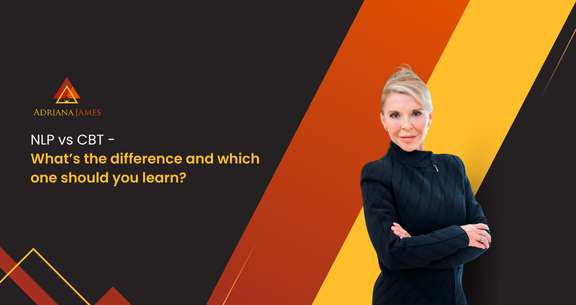To help you decide which path is right for you, here’s a quick breakdown comparing NLP and CBT:
| Feature/Focus | CBT (Cognitive Behavioral Therapy) | NLP (Neuro-Linguistic Programming) |
|---|---|---|
| Level of Mind | Conscious, logical level | Unconscious, identity-level |
| Primary Application | Therapy, clinical settings | Coaching, performance advancement, personal growth |
| Tools & Techniques | Thought records, behavioral experiments, exposure therapy | Anchoring, submodalities, Time Line Therapy® |
| Speed of Change | Gradual, session-based | Rapid (can shift internal coding in minutes) |
| Ideal For | Licensed mental health professionals | Coaches, leaders, entrepreneurs, speakers, parents, change managers, CEO’s, influencers, educators, business owners |
| Change Strategy | Analyzing and challenging thought patterns | Reprogramming internal representations |
If your passion is helping clients overcome clinical issues in a regulated therapy context, CBT offers a reliable, research-supported method administered by trained mental health professionals.
But if you’re focused on peak performance, emotional mastery, or creating rapid transformation in a coaching or leadership environment—NLP offers a different set of tools grounded in behavior modeling, unconscious patterning, and rapid change techniques.
Two Powerful Paths Toward Change
If you’re exploring tools for transformation—whether as a coach, professional, or someone pursuing personal growth—you’ve likely come across both CBT and NLP.
Years ago, I worked with a client who had spent months in CBT-based therapy for a persistent fear of public speaking. She was intelligent, dedicated, and incredibly self-aware. Yet every time she got up to speak, her hands would shake, and her voice would quiver.
In one session using NLP and Time Line Therapy®, she let go of the fear entirely. Not because we talked about it—but because we changed how her unconscious mind stored the experience.
Many people assume CBT and NLP are interchangeable. They’re not. While both aim to support personal change, they differ significantly in application, methodology, and scope of practice.
Understanding CBT and NLP in Context
Cognitive Behavioral Therapy (CBT) is a structured, evidence-based psychological treatment used by licensed therapists and clinicians. According to the American Psychological Association:
“CBT has been demonstrated to be effective for a range of problems including depression, anxiety disorders, alcohol and drug use problems, marital problems, eating disorders, and severe mental illness.”
CBT is grounded in cognitive psychology and aims to help individuals identify, challenge, and restructure distorted thinking patterns. Common CBT tools include:
-
Thought records
-
Socratic questioning
-
Exposure techniques
-
Behavioral experiments
Because CBT is part of the mental health system, it is delivered by licensed professionals working within therapeutic guidelines.
Neuro-Linguistic Programming (NLP), by contrast, is not a clinical modality. It is a powerful model for communication and change, used widely in coaching, business, leadership, and personal development.
NLP focuses on how we internally represent experience, and how shifting these representations can lead to immediate behavioral and emotional change. Standout NLP tools include:
-
State management for positivity and momentum
-
Anchoring emotional resources like confidence or calm
-
Reframing internal meaning structures
-
Time Line Therapy® for releasing limiting beliefs
-
Submodalities to recode how memories and emotions are stored
Where CBT often works at the cognitive level, NLP works at the level of unconscious structure and language—the very blueprint behind thoughts, emotions, and behaviors.
CBT vs NLP in Real-World Application
A CBT practitioner may help a client with social anxiety by:
-
Identifying distorted thoughts (“I’ll say something awkward”)
-
Challenging the thought with logic (“What evidence do I have for that?”)
-
Using exposure techniques to gradually build comfort
-
Documenting progress in a journal
An NLP-trained coach may help a similar client by:
-
Changing how the client visualizes the anxiety scenario
-
Installing an anchor to trigger calmness when entering the room
-
Using Time Line Therapy® to release a core limiting belief from a past experience
-
Future pacing the new behavior to reinforce success
Both aim to help the client — but they operate with different tools and in different professional contexts.
Which One Should You Learn?
If your path is in mental health or clinical therapy, and you meet the qualifications to practice, CBT offers a time-tested, research-backed approach within that framework.
But if you’re a coach, speaker, entrepreneur, or performance professional looking for dynamic tools to create rapid, transformational results, NLP provides a highly effective, client-centered model for change.
Why I Teach NLP (And Why So Many Coaches Choose It)
I have great respect for clinical therapy. But in my decades of training and application, NLP — particularly when paired with Time Line Therapy® — consistently delivers deeper, faster, and more sustainable results for clients operating outside of mental health treatment.
Here’s why:
-
NLP aligns with how the unconscious mind actually works
-
It creates real shifts in minutes — not weeks
-
It’s immediately usable in coaching, leadership, and personal growth conversations
-
It enables transformational work without requiring a diagnostic framework
Take Julia, for example — a certified life coach who came to us after years of studying cognitive and behavioral tools. While she understood the theory, she struggled when clients faced emotional walls that logic couldn’t bypass.
After a few weeks in our NLP program, she used Time Line Therapy® to help a client release years of guilt in a single session. The result? Her client was free. And Julia? Empowered with true mastery.
Learn the NLP Advantage
If you’re curious about how to become a certified NLP Coach or Practitioner — or want to see how this work can change your life and your clients’ lives — explore our next certification training.
There’s a reason NLP has become the go-to methodology for high-level coaches around the world. It’s ethical. It’s practical. And it works.

